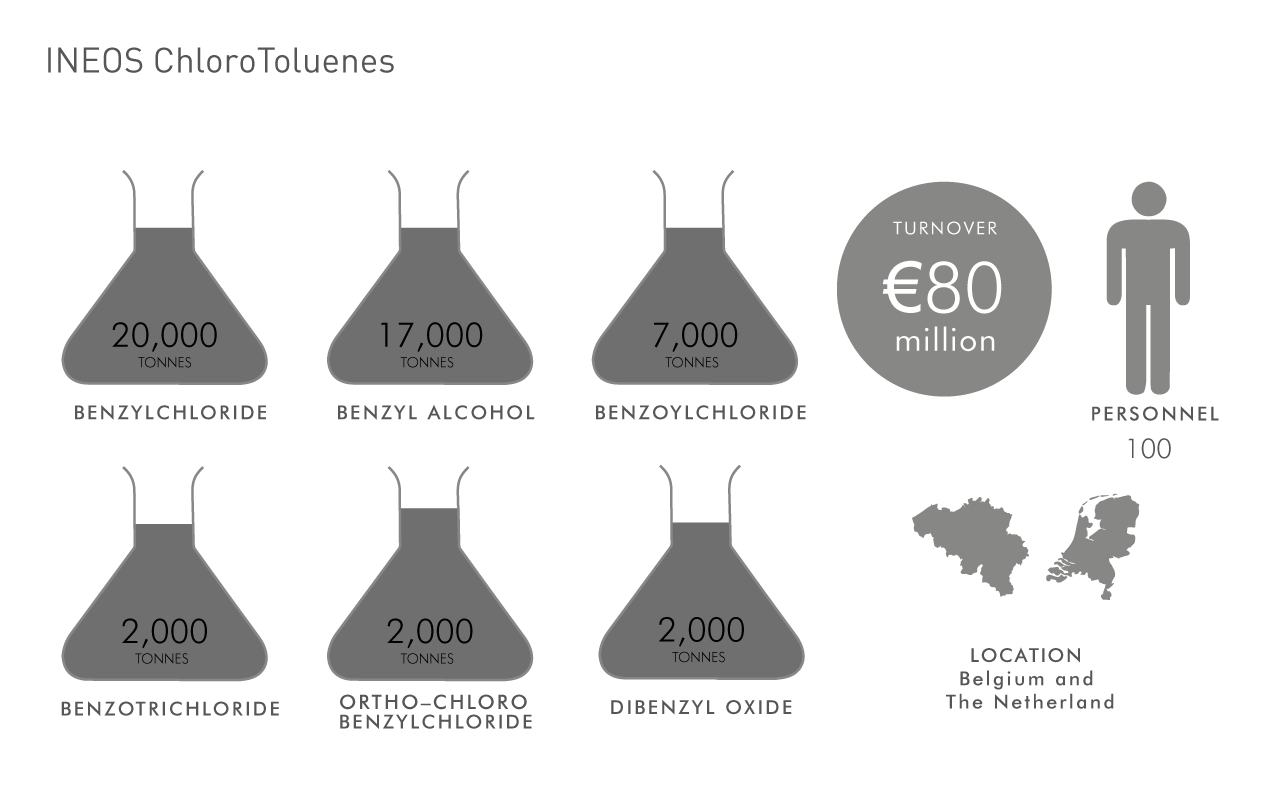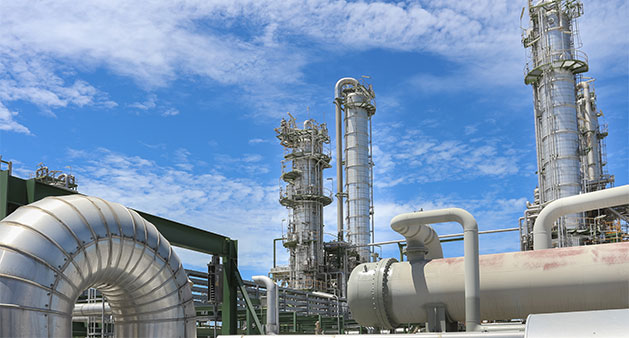INEOS is on the brink of creating a world-class chlorvinyls business. But the INOVYN joint venture with Solvay has achieved something else; it has given one of its other businesses, which until now had kept a relatively low profile, a chance to shine, as Ralston Skinner explained to INCH.
Demosthenes – arguably the greatest of Greek orators – once said that small opportunities were often the beginning of great enterprises.
One who firmly believes that is Ralston Skinner, General Manager of newly-formed INEOS ChloroToluenes.
The speciality chemicals business, which employs about 100 people, is about to stand on its own merits for the very first time.
And Ralston is excited at the prospect of what it can deliver. To its customers around the world. And to the bottom line.
“The business used to be part of the much larger INEOS ChlorVinyls where it was understandably a low priority strategically,” he said. “But all that has now changed with the INOVYN joint venture.”
In short, a perhaps neglected bit of the business is about to take centre stage.
Most of those who work for INEOS ChloroToluenes are based in Tessenderlo, Belgium. The rest are either in Maastricht in The Netherlands or Runcorn in
the UK.
The business, which has an annual turnover of 80 million Euros, sells about 50,000 tons of products every year.
“With the right strategy, we’d hope to double turnover in the next three years,”
said Ralston.
Despite its current size, it is one of the top three manufacturers of chlorinated toluene derivatives in the world.
“There aren’t many of us,” said Ralston.
“In Europe there are only two or three big players who produce benzylchloride. There are no producers in Japan and just one in the US. That presents a massive opportunity for us. The market is there. We just need to develop our innovative logistics platform and we know the customers will want to do business with us.”
In the world of chemistry, benzylchloride is the one we cannot live without.
“It really is the building block for everything you can imagine,” said Business Manager Bruno Stockhem. “You name it – cosmetics, pharmaceuticals, agrochemicals, paints – it owes its life to it.”
INEOS’ main competitor is in Europe. It may have similar technology but there the similarity ends.
“Their heritage is completely different to ours,” said Ralston. “We have developed our products into different sectors.”
”They focus on cresols, the precursors for anti-oxidants, pharmaceuticals and personal hygiene such as toothpastes and mouthwash, whereas we produce products that are used to make things such as disinfectants, agrochemicals, paints, fragrances and resins,” he adds.
The demand for agrochemicals – fertilisers, herbicides and pesticides, which are used by farmers in the production of crops – is one that is growing rapidly in the developing world.
The United Nations believes that 9.2 billion people will be living on Earth in 2075. More people means more mouths to feed and a shortage of arable land. Agrochemicals improve productivity by helping farmers to tackle pests and weeds that can wipe out entire harvests.
Last year Latin America’s agrochemical market grew by around a quarter to around $14 billion, with the world agrochemical market predicted to reach $223 billion by next year.
In May The Crop Protection Association welcomed the UK Government’s commitment to do more to boost domestic agricultural productivity, but urged the European Union to adopt a similar approach.
“Unfortunately, our European colleagues seem to be unaware of the role their continent must play in optimising agricultural productivity,” said Nick von Westenholz, CEO of The Crop Protection Association. “We see this most vividly with EU policy-makers taking an overly precautious approach to crop protection technologies. This has meant that many of the key crop protection products our farmers rely on are, or are at risk of, being taken off the market, even though they have been proven to be safe and are subject to one of the most stringent approvals processes in the world.”
INEOS says the demand for agrochemicals is coming from Brazil, China and South Africa – all countries which have seen rapid agricultural development and want to become more efficient.
“There is a real growth market for this kind of product in those countries,” said Ralston. “The growth is certainly not coming from Europe.”
INEOS ChloroToluenes’ benzyl alcohol is also used in the production of anti-fouling marine paint which stops barnacles and algae from clinging to the hulls of ships, and slowing them down.
It may be a small market, but it’s an important one.
“Barnacles are actually a real problem because ships burn excess fuel when their hulls are encrusted with sealife,” said Ralston. “That in turn leads to increased carbon emissions.”
Producing niche, speciality chemicals, which are not easy to replicate, is what INEOS ChloroToluenes is good at.
“A lot of our customers are also relative specialists,” said Ralston. “So we might make one product for one customer. But we benefit when our customers find new, innovative uses for our products.”
Looking ahead, there are opportunities, challenges and threats.
INEOS faces a logistical challenge if it wants to increase exports to Japan and the US.
“Japan has traditionally been supplied by China but we are looking at what we need to do to compete with China,” said Ralston.
“It is going to be down to clever logistics but what we are good at is finding innovative ways to reach awkward destinations with awkward quantities.”
The fear of increased EU regulation, which makes it difficult or uneconomic to exports chemicals, is always a danger.
“There’s always the chance that one of our chemicals could be added to the ‘at risk’ list which makes it uneconomical,” said Ralston.
As INEOS ChloroToluenes’ plans to grow its business by shipping chemicals around the world, it is also important that it is able to secure its supplies of toluene, which it mixes with chlorine to make all its products.
INEOS ChloroToluenes currently buys most of its toluene from other companies. It knows that a reliable supply is key to its success and is continually looking at new ways to make sure this is not left to chance.
“That’s why we are looking at projects which can also bring toluene from INEOS’ facility in Koln, Germany, to our plant in Belgium,” said Ralston. “That way we ‘keep
it in the family’.”

